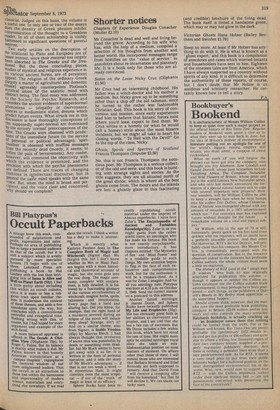Another world
Christopher Gill
The Ancient Concept of Pro'gress, and other Essays on Greek Literature and Belief E. ft Dodds (OUP £4.25) E. R. Dodds is one of the few scholars of Ancient Greece alive today who have, without doubt, made a major intellectual contribution to the subject. The Greeks and the Irra. tional, his best-known work, made two sig; nificant innovations. Ruth Benedict hao distinguished between a 'shame' culture, ,10 which society imposes its values on In; dividuals by group pressures, and a `guilt culture, whose ethics depend on the individual conscience, reinforced by religious sanctions. Dodds applied this distinction to Ancient, Greece, finding in Homeric society a 'sharne culture, and in the subsequent development of Greek ethical thinking a transition frorn shame to guilt. His book also disclosed (what previous scholars had neglected) the role of the 'irrational' in Greek culture, both as a potent force in religious and semi-religious ,practices, and as an element in human nature analysed (in partial anticipation of Freud) 11): Euripides and Plato. In Euripides' Bacchae, or which he published a major edition and commentary, he found historical evidence of the hideous but compelling cult of Bacchus, as well as a fine dramatic description of the disintegration of reason in a personality. The innovative elements in Dodds's work have contributed to a shift of perspective on Ancient Greece. The tendency to assimilate the Greeks, to see them as earlier versions of ourselves, and to idealise them, holding the' up as a uniquely rational people (a tendencY originating in the Renaissance but persisting strongly through the nineteenth century), Is no longer dominant. ContemporarY scholarship has a more anthropological approach to the Greeks, recognising to the full the individual, the alien bases of their culture and thinking. This shift of perspective derived from the efforts of a group of scholars active at the turn of the century, including Frazer, Gilbert Murray and Jane Harrison. But Dodds's work has been substantially influential.
When a distinguished scholar in his seventies publishes a volume of essays, we want to know whether we are being offered substantially new material, or a collection of old pieces. This book is a mixture. There are ten essays: six have already been published in scholarly journals, four (lectures and addresses) have not. There is no unique innovation in the unpublished material: the rationale of the publication is that it presents, in convenient form, a spectrum of Dodds's work, giving substance and completion to our pieture of him. Dodds has excluded articles of purely specialised interest; the stress has been on pieces accessible to the interested non Classicist. Judged on this basis, the volume is a useful one. In only one or two of the essays does the density of Greek phrases inhibit communication of the thought to a Greekless reader. In all of them scholarship is visibly h. arnessed to significant questions of general interest.
Two early articles on the description of the irrational by Plato and Euripides are of lesser interest, since their material has largely been absorbed in The Greeks and the Irratkmal. But the three concluding _ pieces, studies of mystical and religious experience in its various ancient forms, are of persistent
appeal. The religion of the ordinary Greek (largely rituals a matter of agricultural and domestic
) agreeably counterpoints Plotinus's roYstical union of the analytic mind with abstract being. The final essay was addressed to the Society for Psychic Research, and considers the ancient evidence of supernormal Phenomena — telepathy or clairvoyance, trances or mediumistic states, dreams which predict future events. What struck me in this discussion is how thoroughly conceptions of the supposedly super-normal are dominated by the entirely 'normal' preoccupations of the hole. The Greeks were obsessed with prechcbons of the immediate future (in the service of Personal or political advantage); 'spinhualism is obsessed with muffled messages from the recently dead (mostly, it seems, to soften the pain of bereavement). Any reader, however, will commend the objectivity with Which the evidence is presented, and the Precision with which the psychic phenomena are defined. There are traces of changing fashions in intellectual discourse; but in general the sar—iie mind speaks with the same Voice. But, when the mind is broad and percipient, and the voice clear and concerned, Why should we complain?



































 Previous page
Previous page